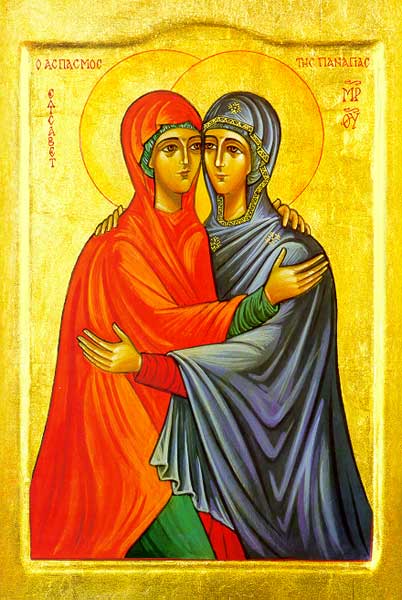Excerpts from the new Translation of
Encyclical Letter of the Holy Father John Paul II
On Divine Mercy
Dives in Misericordia Part II
Mary, entering the house of Zechariah,magnifies the Lord with all her soul for “His mercy,” which “from generation to generation” is bestowed on those who fear Him. A little later, as she recalls the election of Israel, she proclaims the mercy which He who has chosen Israel holds “in remembrance” for all time (Cf. Lk 1:49-54). http://www.printeryhouse.org/ProdPage.asp?prod=M07
http://www.printeryhouse.org/ProdPage.asp?prod=M07
In both places it is a case of hesed, i.e., the fidelity that God manifests to His own love for the people, fidelity to the promises that will find their definitive fulfillment precisely in the motherhood of the Mother of God (Cf. Lk 1:49-54).
Afterwards, in the same house, when John the Baptist is born, his fatherZechariah blessed the God of Israel and glorifies the mercy God promised to our fathers and for “remembering” His holy covenant (Cf. Lk 1:72). Here too it is a case of mercy in the meaning of hesed, insofar as in the following sentences, in which Zechariah speaks of the “tender mercy of our God,” there is clearly expressed the second meaning, namely, rahamim (Latin translation: viscera misericordiae), which rather identifies God’s mercy with a mother’s love.
 |
| icon of the birth of John th Baptist in the church at Ein Karem |
In His teaching, Christ Himself draws on this inheritance of mercy from the Old Testament, simplifies it and deepens it. This is most clearly seen in the parable of the Prodigal Son (Lk 15:14-32). Even though the word “mercy” is not used in the parable, the deepest meaning of divine mercy is described. The words of the Old Testament for mercy are not used, but the drama played out between the loving father and his two sons – a drama of love and prodigality – helps us to understand the “mystery of mercy.”
.........
“How many of my father’s hired servants have bread enough to spare, but I perish here with hunger.” He measures himself by the measuring stick of the goods that he has lost and “has not,” against the goods that the hired hands “have” in his father’s house. These words express, above all, his attitude toward material goods; yet, under their surface is hidden the tragedy of lost dignity, the consciousness of squandered sonship.
At first sight he seems to be acting because of hunger and poverty, yet his motive is permeated by a consciousness of deeper loss: to be a hired hand in his father’s house. This certainly is a great humiliation and shame. Nevertheless, the prodigal son is ready to undergo that humiliation and shame. He realizes that he no longer has any right except to be an employee in his father’s house. His decision is taken in full awareness of what he has already deserved and of what he can still have by right in accordance with the norms of justice. Exactly this reasoning shows that at the center of the prodigal son’s consciousness is found a sense of a lost dignity, a sense of that worth which comes from being a son of a father. And so, with his decision made, he sets out on his way.
In the parable of the prodigal son, the word “justice” is not used even once, just as the word “mercy” is not used. But justice is related to love, and is seen as mercy, and described with great precision in the gospel parable. It becomes evident that love becomes mercy when it is necessary to cross the precise bounds of justice – precise and often too narrow. The prodigal son, having wasted everything he had received from his father, felt he deserved, after his return to work in his father’s house as a servant, to be earning a living and gradually building up a certain provision of material goods, but never in the amount he had before he departed. This would be demanded by the order of justice, especially since as son he not only squandered his portion of inheritance, which he received from the father, but he also touched his father and offended him by his whole conduct. Because this conduct had in his own eyes deprived him of dignity as a son, it could not be a matter of indifference to the father. It had to hurt him. It had to involve him in some way. It was, after all, his own son, and that relationship could never be changed or destroyed by any kind of behavior. The prodigal son is aware of this; and this awareness makes him see clearly his lost dignity, and evaluate honestly his position, which he might still earn in his father’s house.
 O Jesus, You inspired Saint Faustina with profound veneration for Your boundless Mercy. Grant me through her intercession, if it be Your holy will, the grace ...for which I fervently pray. My sins render me unworthy of Your Mercy, but be mindful of Saint Faustina's spirit of sacrifice and self-denial, and reward her virtue by granting the petition which, with childlike confidence, I present to You through her intercession.
O Jesus, You inspired Saint Faustina with profound veneration for Your boundless Mercy. Grant me through her intercession, if it be Your holy will, the grace ...for which I fervently pray. My sins render me unworthy of Your Mercy, but be mindful of Saint Faustina's spirit of sacrifice and self-denial, and reward her virtue by granting the petition which, with childlike confidence, I present to You through her intercession.

